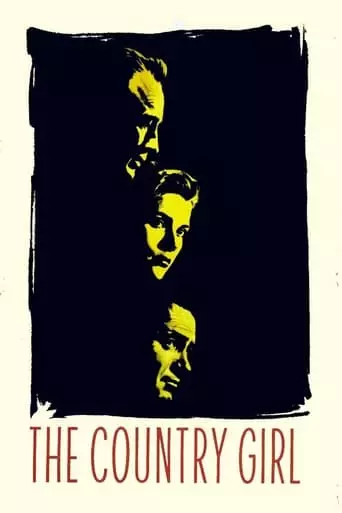An ex-theater actor is given one more chance to star in a musical yet his alcoholism may prevent it from happening.
The Country Girl (1954), directed by George Seaton, is a powerful drama adapted from Clifford Odets’ Broadway play. The film explores themes of personal struggle, redemption, and the sacrifices made for love and ambition. It stars Bing Crosby, Grace Kelly, and William Holden, each delivering standout performances in a story that feels both intimate and universal. Here’s an analysis of the film, its plot, reasons to watch, and the emotional journey it offers viewers.
Plot Summary
The film centers around Frank Elgin (Bing Crosby), a once-famous Broadway star who has fallen from grace due to alcoholism. His wife, Georgie (Grace Kelly), has stood by him through his downward spiral, caring for him despite the emotional and physical toll it has taken on her. The story’s third key figure is Bernie Dodd (William Holden), a young, ambitious Broadway director who is tasked with resurrecting Frank’s career for a new play.
As the film progresses, Bernie tries to get Frank back into the spotlight, but he faces significant resistance. Frank is deeply insecure about his abilities and fears that he can never reclaim his former glory. At the same time, Georgie struggles with her own desires and the burdens of being Frank’s caretaker. She is torn between supporting her husband’s comeback and her own yearning for a life outside of his shadow.
The emotional crux of the film lies in Georgie’s internal battle, as she seeks to protect Frank while also confronting her own needs and dreams. Ultimately, the film examines how love, loyalty, and personal redemption intersect, particularly when it comes to reconciling one’s past with the future.
Reasons to Watch The Country Girl
- Grace Kelly’s Oscar-Winning Performance: The Country Girl marks a rare dramatic role for Grace Kelly, who is known for her more glamorous roles in films like Rear Window and To Catch a Thief. Her portrayal of the long-suffering Georgie Elgin won her the Academy Award for Best Actress. Her nuanced performance as a woman caught between devotion to her alcoholic husband and her own aspirations is one of the film’s highlights
- Bing Crosby’s Breakout Dramatic Role: Crosby, who was typically cast in musical or comedic roles, delivers a tour de force as the washed-up actor, Frank Elgin. His performance as a man battling his demons and grappling with the possibility of a comeback is heartfelt and complex. The film was a career-defining moment for Crosby, earning him an Oscar nomination
- William Holden’s Strong Supporting Role: As Bernie Dodd, Holden brings a much-needed energy to the film. His character, a director with a vision, is both sympathetic and frustrating as he tries to balance artistic ambition with his personal feelings toward Georgie. Holden’s chemistry with Kelly adds emotional depth to the narrative
- Realistic Depiction of Personal Struggles: The film delves deeply into the psychology of its characters, particularly Georgie’s sacrifice and the toll of caring for an alcoholic partner. The portrayal of Frank’s addiction and its impact on both him and his wife feels raw and authentic
- Cinematography and Direction: The film’s cinematography, by John F. Warren, complements its somber tone, with careful lighting and shadow play that reflect the emotional turmoil of the characters. Director George Seaton’s adaptation of Odets’ play captures both the grandeur and the intimacy of the Broadway world
- Timeless Themes of Love and Sacrifice: The emotional heart of the film lies in the exploration of love and the sacrifices people make for it. Georgie’s devotion to Frank is both heart-wrenching and admirable. The story provides a timeless examination of how love can both uplift and burden those who give everything for it
- A Unique Broadway Storyline: The film’s backdrop of Broadway theater adds layers of artistic tension to the plot. The pressure to succeed on stage mirrors the personal struggles of the characters, creating a narrative where the stakes are high both professionally and personally
- A Rare Hollywood Melodrama: As a 1950s melodrama, The Country Girl combines the era’s characteristic glamour with emotional depth. It stands out in Hollywood’s golden age for its portrayal of more grounded, complex characters, offering a break from the more idealized depictions of relationships at the time
- Memorable Dialogues and Quotes: The script, written by George Seaton, features sharp, memorable dialogues that reveal the inner conflicts of the characters. The exchanges between Frank and Georgie, and between Georgie and Bernie, are laden with emotional subtext
- Exploring the Intersection of Art and Life: The film explores the blurred line between personal lives and the art of performance. Frank’s return to the stage becomes not just a career move but a personal redemption story, offering a reflection on how performance can mirror real life
Emotional Impact
Watching The Country Girl leaves you with a deep sense of empathy and reflection on the complexities of human relationships. The film’s slow-building tension, punctuated by moments of personal triumph and failure, will likely evoke mixed emotions. Viewers may feel sadness for the characters’ struggles, admiration for their resilience, and a sense of catharsis as they see the possibilities of redemption.
In the end, The Country Girl is a thought-provoking exploration of personal and artistic redemption, love, and sacrifice. It’s a film that will resonate with anyone who has ever had to choose between personal happiness and loyalty to someone they love. The blend of heartache, hope, and the human desire for renewal will leave you feeling both emotionally spent and uplifted

